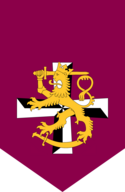Defence Command (Finland)
60°09′51″N 24°56′59″E / 60.1641782°N 24.9496668°E
| Defence Command | |
|---|---|
| Pääesikunta Huvudstaben | |
 Colours of Defence Command | |
| Active | Since 2 February 1918 |
| Country | |
| Type | Joint command headquarters |
| Size | 328 military, 186 civilian (2015) |
| Part of | Ministry of Defence |
| Garrison | Guard's Garrison, Fabianinkatu 2, Helsinki, Finland |
| Engagements | |
| Website | puolustusvoimat.fi |
| Commanders | |
| Chief of Defence | General Timo Kivinen |
| Chief of Staff | Lieutenant General Eero Pöytsiä |
Defence Command (Finnish: Pääesikunta, Fenno-Swedish: Huvudstaben), organized as Headquarters (Finnish: Päämaja, Swedish: Huvudkvarter) during wartime, is the joint command headquarters of the Finnish Defence Forces and a central government agency. Active since 1918, it leads and monitors the execution of the duties prescribed to the Defence Forces, such as the military defence of Finland.
History

Finland declared independence on 6 December 1917 and by the end of the year, a conflict emerging from the strife between the Reds, led by the Social Democratic Party, and the Whites, led by the conservative-based senate, seemed inevitable. On 16 January 1918, Chairman of the Senate of Finland, Pehr Evind Svinhufvud, appointed General Carl Gustaf Emil Mannerheim as the commander-in-chief of the Government's forces and a few days later Mannerheim met with his senior staff at Hotel Ernst in Vaasa, Finland.[1] The Finnish Civil War commenced on 27 January 1918. Defence Command was established as the Headquarters of White Finland's military in Vaasa by the commander-in-chief's day order (Finnish: päiväkäsky, Swedish: dagorder) number 1 on 2 February 1918.[2]
Organisation

Defence Command is subordinate to the Chief of Defence, commander of the Finnish Defence Forces. The Command is responsible for planning and executing joint operations of the Defence Forces as well as guiding and resourcing the three branches of the military, the Finnish National Defence University, and agencies under its control.[3][4] It is led by the chief of staff, usually a lieutenant general, with four deputy chiefs of staff focusing on personnel, logistics and armaments, operations, and strategy, respectively.[5] Lieutenant General Timo Kivinen started as chief of staff in June 2016.[6][7] As of 2015, 328 military and 186 civilian staff served at the Command.[8]
In addition to an executive office and an internal audit unit, Defence Command is divided into ten divisions (Finnish: osasto, Swedish: avdelningen) with a continental staff system:[5][8]
- Executive Office
- Internal Audit Unit
- Public Information Division
- Technical Inspection Division
- Personnel Division (J1)
- Intelligence Division (J2)
- Operations Division (J3)
- Logistics Division (J4/J10)
- Plans and Policy Division (J5/J8)
- C5 Systems Division (J6)
- Training Division (J7)
- Legal Division (J9)
Five subordinate establishments operate under the direction of Defence Command:
- Finnish Defence Forces C5 Agency
- Finnish Defence Intelligence Agency
- Finnish Defence Research Agency
- Shared Services Centre
- Defence Forces Logistics Command
Infrastructure
Defence Command is co-located with the Ministry of Defence in the Kaartinkaupunki neighborhood of Helsinki at the Guard's Garrison, designed by architect Carl Ludvig Engel and completed in 1822. The building served as the original garrison of the Guard of Finland and from 1918 to 1938 as the garrison of the White Guard. It was destroyed during the Continuation War in the February 1944 bombing of Helsinki and rebuilt after the wars as well as supplemented in the 1960s with additional buildings designed by architects Viljo Revell and Heikki Castrén.[9][10]
See also
References
- ^ Korpisaari, Harri (2009). Itsenäisen Suomen puolesta – Sotilaskomitea 1915–1918 [For Independent Finland. The Military Committee 1915–1918] (in Finnish). Helsinki: University of Helsinki. ISBN 978-952-222-144-5. Archived from the original on 2018-03-02.
- ^ Heinrichs, Erik (1957). Mannerheim Suomen kohtaloissa I - Valkoinen kenraali 1918-1919 [Mannerheim in Finland's destinies I - The White General 1918-1919] (in Finnish). Keuruu: Otava.
- ^ "Act on the Defence Forces 557/2007". www.finlex.fi. 2008-01-22. Archived from the original on 2017-12-01. Retrieved 2017-11-21.
- ^ "Valtioneuvoston asetus puolustusvoimista 1319/2007" [Government Decree on the Defence Forces 1319/2007]. www.finlex.fi (in Finnish). 2017-11-16. Archived from the original on 2017-12-01. Retrieved 2017-11-21.
- ^ a b "Defence Command". Finnish Defence Forces. Archived from the original on 2017-06-21. Retrieved 2017-11-21.
- ^ "General officers". Finnish Defence Forces. Archived from the original on 2017-06-26. Retrieved 2017-11-21.
- ^ "Puolustusvoimien strategiapäällikkö nousee pääesikunnan päälliköksi". Yle Uutiset (in Finnish). 2017-02-09. Archived from the original on 2017-12-01. Retrieved 2017-11-21.
- ^ a b Puolustusvoimauudistuksen raportti, liite 19 [Report of Defence Force Reform, Annex 19] (in Finnish). Helsinki: Finnish Defence Forces. 2016. Archived from the original on 2017-05-06.
- ^ "Excerpts from the History of the Ministry of Defence". Ministry of Defence (Finland). Archived from the original on 2017-12-01. Retrieved 2017-11-21.
- ^ "Kaartin kasarmi". National Board of Antiquities (in Finnish). 2009-12-22. Archived from the original on 2017-12-01. Retrieved 2017-11-21.
